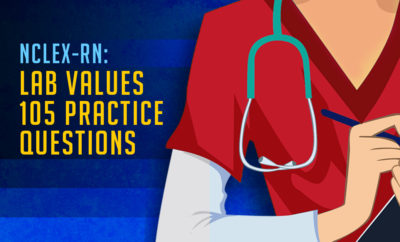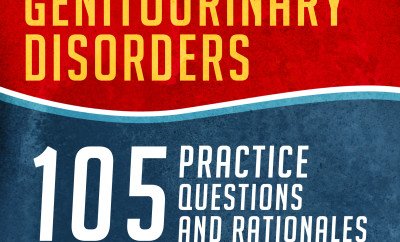
Nursing School
10 Successful Ways To Study Less & Learn More In Nursing School
In nursing, there is simply too much information to cram into your brain and memorize verbatim. It took me a long time to learn how to be a more effective studier, but I have started to reap the rewards. Although I am in grad school now, I finally learned how to study better – not longer. Just because you study for a longer period of time does not necessarily mean you are fully grasping the topic or memorizing anything. You must figure out what works specifically for you, but below are ways to be a more effective studier.
Make a Schedule
These days, making a schedule is more important than ever. I am extremely busy (maybe a tad neurotic ha), but every night, I plan my schedule for the next day. Now, I allow myself to waiver if necessary, but this sets the standard for what I want to accomplish in a day. If you plan to devote a day to studying, plan what topics you want to complete in a certain time frame. Turn off your phone and any notification that might otherwise distract you. Additionally, close tabs on your computer like Facebook or other social media sites. Finally, above all, plan your breaks.
Plan Your Breaks
There are multiple reasons to plan your breaks. As mentioned above, I never study for more than two hours at a time without a 30-45 minute break. Breaks are scientifically proven to boost your productivity. And in a world of multi-tasking, breaks can help you focus better on a single task. I sometimes use breaks to peruse social media as a reward, take naps, grab a cup of coffee or lunch, call my parents, or break a sweat. This leads me to my next study tip…
Take a Nap
This has become my favorite and most effective study tip. I first started taking naps while studying after reading this article from Harvard researchers. I frequently spend my days studying in the library at school. After two hours of studying, I lay my head down on the desk and set an alarm on my phone for 30 minutes. Short naps have been proven to help with memorization, learning, and recall. Once again, you must do what works for you, but I would definitely give this one a try.
Speed up Lecture Recordings
Wow, do I wish someone had told me this before last semester. After almost 11 years of higher education, a friend suggested I increase the speed of my lecture recordings to 1.5x or 2x. If you are fortunate to have your lectures recorded and uploaded to iTunes or your schools’ Mediasite, you shouldn’t have a problem doing this. I listen to the lecture at the faster rate and follow along with PowerPoint slides, or whatever outline has been provided.
Work Out
I know no one wants to hear this one because it has been beaten into the ground, but scientific research shows multiple benefits of cardiovascular activity for 30 minutes per day. If the thought of going to a gym makes you queasy, then consider a walk/jog around the block. Anything will do and your IQ will thank you.
Reward yourself
I mentioned this a little above regarding my breaks. I like to reward myself for my hard work, so frequently on my planned breaks I will allow myself to check Instagram, which is my guilty pleasure. Other rewards for me typically revolve around food. For instance, I will plan something like this: “If I complete my cardiac lecture, I will allow myself to grab a cookie and a latte on my planned break, while double-tapping on Instagram.” It’s the little things that motivate us. This will be different for everyone, but do what works for you!
Study Group
Note how this isn’t called “social group.” For many years I shied away from study groups because I found that my peers were not as serious as I was. However, these days, all of my peers are serious and I cannot recommend studying together enough. I would suggest following several “rules.” Still, make a schedule and stick to it. Do not have more than four, serious people in your study group and talk through the subjects aloud. Peers are great people to hold you accountable and may come up with ideas you never considered.
Write It Out and Make Diagrams
Drawing pictures and writing notes is particularly helpful for me in anatomy and physiology. Once again, science has proven that we store information we hand write and draw better than if we type it. I have a large sketchpad that I put on an easel and copy diagrams and notes with Sharpies (I love the colors). But, I also have friends who use dry erase boards in the library and essentially do the same thing.
Sleep
Okay all, I get it, we are busy. It took me many years to realize sleep is an absolute necessity. Cramming the night before an exam does not work, especially when the topics become more complex. It is not honorable, to boast about being able to live off of four hours of sleep per night and the old saying, “you can sleep when you’re dead,” has been debunked time and time again. The benefits of adequate sleep are endless – better memory, recall, decreased inflammation, good sleepers eat fewer calories, increased immune system, better emotional stability, lower risk of heart disease and stroke, etc., etc., etc. You can follow all of the tips above, but if you don’t sleep the individualized amount your body needs, you will be hurting yourself in the long run.
And Finally…
Be sure to do what works for you. It might take some time to figure out your strengths and weaknesses, but once you do, you will be working smarter, not harder. While I definitely still have nights where I work late and have hard days, my efforts to learn to study more effectively have paid off. Good luck to you all and I’m so glad you are the future of nursing!

Written by: Danielle LeVeck
Check out her awesome blog: www.nurseabnormalities.com
Follow her on Instagram: @NurseAbnormalities
Follow her Facebook Page: Nurse Abnormalities
Follow her on Twitter: @NursAbnormality
Follow her on Pinterest: Nurse Abnormalities





0 comments